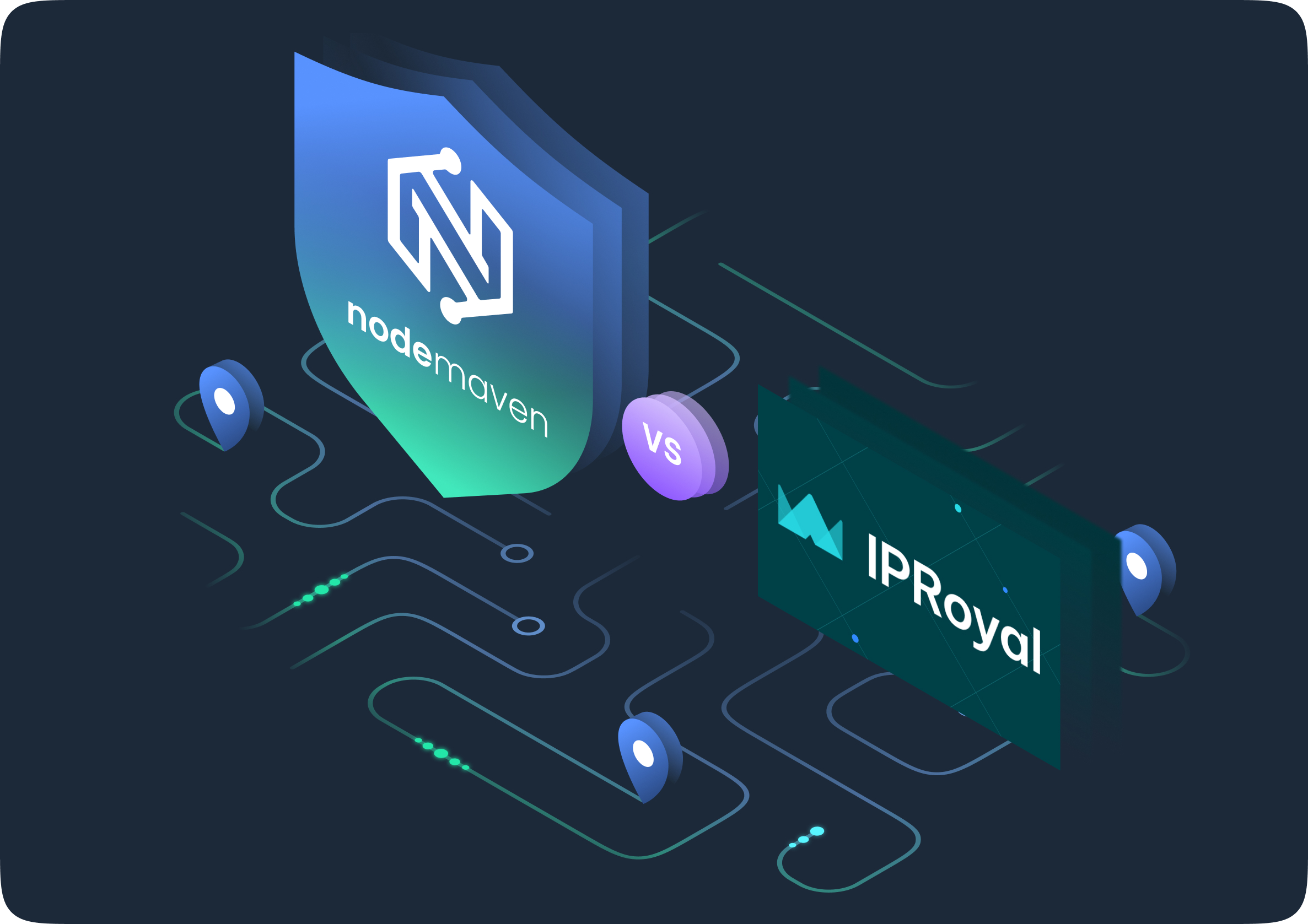Isn’t it exciting that 1 in every 3 people worldwide uses proxy services? Do you?
Nevertheless, not all proxies are created equal, and understanding the difference between protocols is key to maximizing their potential. Among the most popular options are SOCKS and HTTP proxies, each designed to serve unique purposes and meet specific user needs.
In this article, we will explore the key differences between SOCKS vs HTTP proxies, their use cases, and how to choose the best one for your needs.
Understanding the Basics of Proxies
Proxies have become inseparable in today’s internet landscape. They not only give privacy, but also unlock access to geo-restricted content and help businesses manage data and accounts at scale.
From mobile proxies that mimic connections from real mobile devices to static residential proxies that provide consistent IP addresses, and rotating residential proxies that dynamically change IPs to avoid detection, each type serves specific purposes.
Understanding these variations is crucial for selecting the right solution that aligns with your goals and maximizes efficiency.
What Are Proxies and Why Are They Used?
Proxies act as intermediaries between your device and the internet, forwarding requests from clients to servers and returning responses back to the clients.
They help mask your real IP address, enhancing privacy and security. Businesses and individuals use proxies for a wide range of purposes, such as bypassing geo-restrictions, web scraping, managing multiple accounts, and enhancing anonymity.
Proxy protocols dictate how data is transferred between your device and the proxy server. Among the most popular protocols is the battle between SOCKS vs HTTP proxy, each with unique strengths and applications.
Key Proxy Protocols: An Overview of SOCKS vs HTTP
SOCKS and HTTP proxies serve similar functions but operate differently. SOCKS proxies handle a wider range of protocols and are versatile in their applications. HTTP proxies, on the other hand, are tailored for web traffic and excel in managing HTTP and HTTPS requests.
What Is a SOCKS Proxy?
SOCKS (Socket Secure) proxies stand out for their flexibility and transport-layer operation, making them ideal for tasks that go beyond traditional web browsing.
Their simplicity and versatility have earned them a loyal user base across gaming, streaming, and peer-to-peer file-sharing communities.
Benefits of Using a SOCKS Proxy
SOCKS proxies simply forward data, making sure the connection between your device and the destination server is uninterrupted. Here are some benefits to using SOCKS proxies:
- Versatility: SOCKS proxies work with a variety of applications, including email, file transfers, and peer-to-peer networks.
- High anonymity: Since SOCKS proxies don’t interpret the data they transfer, they offer enhanced privacy and security.
- Fewer restrictions: Unlike HTTP proxies, SOCKS proxies aren’t limited to web traffic, making them suitable for more diverse use cases.
What Is an HTTP Proxy?
HTTP proxies specialize in web traffic, making them the go-to choice for businesses and individuals working with HTTP or HTTPS data. From data scraping to content filtering, these proxies are tailored for tasks that demand efficiency and control in the online realm.
Benefits of Using an HTTP Proxy
By interpreting web traffic, HTTP proxies can filter content, block ads, and cache frequently accessed data.
Why you should use HTTP proxies:
- Optimized for web traffic: HTTP proxies are perfect for tasks that revolve around browsing, web scraping, and data collection.
- Content filtering: Businesses can use HTTP proxies to block unwanted content or ads.
- Caching: By storing frequently accessed web pages, HTTP proxies improve browsing speed and reduce bandwidth consumption.
SOCKS vs HTTP Proxy: Key Differences
When comparing SOCKS and HTTP proxies, it’s essential to look at performance, security, and compatibility. While both serve as intermediaries to enhance your online activities, their operational focus sets them apart. Let’s break down how they differ and where each excels.
Performance and Speed
SOCKS proxies are generally faster because they don’t process or modify data packets. However, HTTP proxies excel in web traffic tasks due to their ability to cache data and filter content, which can enhance performance for specific use cases.
Security and Anonymity
While both protocols offer anonymity by masking your IP address, SOCKS proxies provide higher security for non-web applications due to their transport-layer operation. HTTP proxies, however, can inspect and modify web traffic, which can add an extra layer of security but at the cost of reduced privacy.
Compatibility and Use Cases
SOCKS proxies are more versatile, handling any TCP-based application, whereas HTTP proxies are specialized for web traffic. For example:
- Use SOCKS proxies for torrenting, gaming, and streaming.
- Opt for HTTP proxies for web scraping, ad verification, and content filtering.
Choosing the Right Proxy for Your Needs
When it comes to choosing the best proxy for your tasks, it is crucial to understand the differences between SOCKS vs HTTP proxy.
Each proxy type has its strengths and weaknesses, making them more or less suitable depending on your specific use case. This section will guide you on when to use each and help you weigh factors like cost, complexity, and compatibility with your needs.
When to Use Socks Proxies
SOCKS proxies are versatile and excel in tasks beyond just web traffic. Their ability to handle TCP protocols makes them a go-to option for diverse scenarios.
For example:
- Torrenting and file sharing: SOCKS proxies are often used in peer-to-peer (P2P) applications, where secure and uninterrupted file transfers are essential.
- Gaming: Gamers rely on SOCKS proxies to bypass regional restrictions and reduce latency, granting smoother gameplay.
- Streaming: Platforms like Netflix or BBC iPlayer often have geo-restrictions. SOCKS proxies allow users to access content from other regions effortlessly.
In these cases, the transport-layer operation of SOCKS proxies provides the speed and anonymity needed for ideal performance.
When to Use HTTP Proxies
HTTP proxies specialize in handling web traffic, making them the ideal choice for tasks that require working with HTTP or HTTPS data.
Some common applications include:
- Web scraping: For businesses collecting data from websites, HTTP proxies enable accessing and scraping data without triggering detection mechanisms. For instance, a digital marketer scraping competitor pricing can benefit from HTTP proxies’ optimized performance.
- Ad verification: Advertisers use HTTP proxies to confirm that their ads display correctly across regions, making sure your campaigns are effective.
- Content filtering: Schools or workplaces often deploy HTTP proxies to restrict access to specific websites, helping maintain productivity or uphold content policies.
These proxies also offer caching capabilities, improving speed and reducing bandwidth usage for web-heavy tasks.
Comparing Costs and Setup Complexity
The cost and complexity of setting up proxies can significantly influence your choice.
- HTTP proxies: These proxies are generally more cost-effective and easier to configure, making them ideal for businesses with web-focused tasks. For instance, a company running multiple web scraping campaigns can benefit from the straightforward setup of HTTP proxies.
- SOCKS proxies: While slightly more expensive, SOCKS proxies justify their cost through their versatility. Setting them up might involve additional configurations, especially for gaming or streaming tasks, but the ability to handle diverse protocols makes them a worthwhile investment for users with varied needs.
By evaluating your budget, technical requirements, and operational goals, you can determine which proxy type aligns best with your objectives.
Enhance Your Proxy Experience with NodeMaven
Choosing the right proxy provider is as important as selecting the correct proxy type.
With NodeMaven, you get access to cutting-edge technology, unmatched proxy quality, and exceptional support. Whether you’re using SOCKS or HTTP proxies, NodeMaven is here to help you succeed:
- Unmatched compatibility: NodeMaven’s proxies support both SOCKS and HTTP protocols, catering to a wide range of applications.
- Premium residential proxies: With a pool of over 30 million premium residential IPs, NodeMaven grants smooth and undetectable operations.
- Advanced targeting options: Access geo-targeted proxies with ISP and region-level precision for tailored results.
- Scalable solutions: Whether you need proxies for small-scale tasks or enterprise-level operations, NodeMaven’s flexible plans have you covered.
- 24/7 support: Our dedicated team is always ready to help you choose the best proxies for your needs.
Explore the possibilities today!


